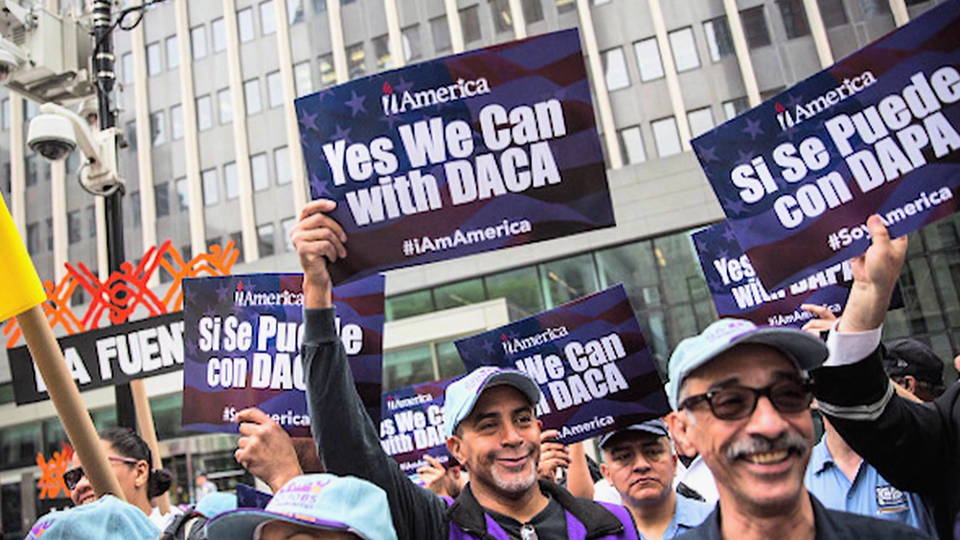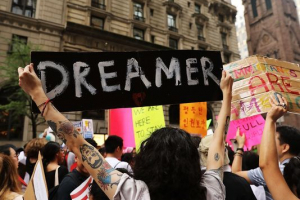 In 2012 President Obama, using his executive power began a program that permits individuals who entered the United States before turning sixteen and who meet certain rules to file Deferred Action for Childhood Arrivals (DACA). If you are one of the thousand of people that have received Deferred Action for Childhood Arrivals (DACA), you may be able to travel outside the U.S. and return legally. The process is called “Advance Parole.” One of the advantage of DACA is that the recipient may seek permission to travel abroad temporarily for humanitarian, educational, or employment purposes.
In 2012 President Obama, using his executive power began a program that permits individuals who entered the United States before turning sixteen and who meet certain rules to file Deferred Action for Childhood Arrivals (DACA). If you are one of the thousand of people that have received Deferred Action for Childhood Arrivals (DACA), you may be able to travel outside the U.S. and return legally. The process is called “Advance Parole.” One of the advantage of DACA is that the recipient may seek permission to travel abroad temporarily for humanitarian, educational, or employment purposes.
Advance parole , an administrative practice originating from the general parole authority in INA § 212(d)(5),. It gives an individual who is in the United States advance authorization to re-enter the United States after temporary voyage abroad. If the U.S. Citizenship and Immigration Services (USCIS) grant s advance parole, it issues a Form I-512L, an advance parole authorization document. This paper allows a Customs and Border Protection (CBP) or other immigration inspector at a U.S. port-of-entry to parole an person into the United States.
Who Is Entitled to Request Advance Parole as a DACA Beneficiary?
In order to be granted advance parole, a DACA recipient generally must show that s/he is traveling abroad for humanitarian, employment, or educational purposes.
Simply wanting to take a vacation is not enough to qualify DACA recipients for an Advance Parole travel document. You will need to show not only that you have been approved for DACA, but that you have a reason for traveling, either for:
- Critical humanitarian purposes: includes obtaining medical assistance, attending a funeral service for a family member, visiting a sick relative, or other urgent family-related purposes.
- Educational reasons : includes study abroad programs and academic research, or
- Employment reasons , overseas assignments or client meetings, interviews, conferences, trainings in other countries, and travel needed to pursue a job with a foreign employer in the United States.
What proof must be submitted with the Advance Parole application?
DACA beneficiaries must provide as much proof as possible to justify the purpose of intended travel abroad. For a trip concerning a humanitarian purpose, appropriate evidence includes but is not limited to the following:
- A letter from a medical professional clarifying the reason for the need to travel abroad to obtain medical treatment;
- A letter from a hospital or treating medical professional describing the relative’s ill condition; and/or
- A death certificate for a deceased relative
For a trip involving an educational reason, evidence includes but is not limited to the following:
- A letter from an educational institution describing the purpose of travel abroad; or
- A document showing enrollment in a program or class and documents showing the applicant is required to travel for a program or class or will benefit from such travel.
For a trip involving an employment reasons, appropriate evidence includes but is not limited to the following:
- A letter from an employer detailing the need to travel abroad; and/or
- A document showing an employment need, such as a conference or training program, and showing the applicant’s participation.
What are the Risks of Traveling With Advance Parole as a DACA Recipient?
Understand that your DACA status is not enough by itself to permit you to leave the U.S. and be admitted back upon your return. You must first apply for and be granted an Advance Parole Document. If you leave without Advance Parole, you will probably be denied reentry and your DACA approval will be cancelled.
However, being approved for Advance Parole is not a guarantee that you will be admitted back to the U.S.. The Customs and Border Patrol (CBP) officer upon your return can deny your entry if he or she thinks you are “inadmissible,” usually for for health or security reasons.
Worse yet, if you have an outstanding order of removal or deportation on your record (perhaps because an immigration court ordered you deported, or you failed show up for a court hearing), leaving the U.S. could be viewed as self-deportation. You would not be allowed to return to the U.S. for numerous years (the exact span depends on the reason for which you were ordered deported). You should consult with an attorney if you are in this position. The attorney may be able to reopen the immigration proceedings and then have them administratively close the case based on your DACA grant.
How a DACA Recipient Applies for Advance Parole
To apply for Advance Parole, you will need to submit the following to USCIS:
- Form I-131, issued by USCIS (see below).
- Copy of a photo identity document, such as a driver’s license or passport identity page.
- Proof that you have been approved for DACA (Form I-797).
- Documents in support of your claimed basis for travel
- Information about your intended dates of travel and the duration of your trip or trips (which you should provide in Part 4 of Form I-131), and
- Application fee ($360 as of 2013; see the USCIS website for the latest).
Form I-131 is available from the USCIS website as a free download on the I-131, Application for Travel Document page of the USCIS website, as are the instructions.
Consulting with an experienced immigration attorney for an analysis of whether you should attempt to apply for Advance Parole and the risks of departure, and for assistance with preparing a convincing application, would be an exceptional idea.
`













